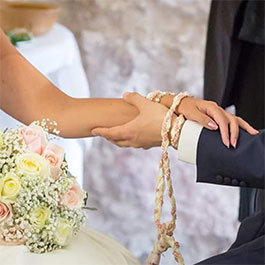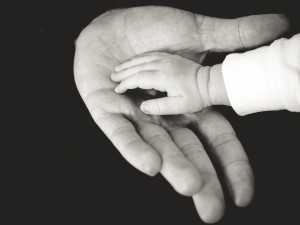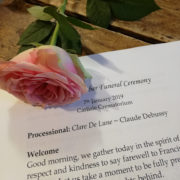There’s a simple question that I ask myself every time I head off to officiate a ceremony: how will the guests choose to be involved? Will they watch and witness with respect and love, sitting in silence and reverence, or will they chatter amongst themselves as if just watching a TV show?
A ceremony—whether it’s a funeral, naming, wedding or other rite of passage—is a small moment in time (anywhere between 10 and 30 minutes) in which we have permission to slow down, to step away from bustle of daily life; and we can choose to honour the art of ritual when we’re invited into that sacred space ~ or, we can act as if it’s just another mundane event.

Four-element altar for Sara and Michael’s Wedding. Amethyst, candle, feather, and water infused under the Full Moon. Celtic cross, and handfasting ribbon. The rings were on a twig of rosemary for remembrance. www.veronikarobinson.com/celebrant
In an ideal world, and it’s certainly something I try to do in my daily life, we would see each day (and each moment) as sacrosanct, and be mindful of how we experience time and space and symbolism. But this world isn’t ideal. We, as a culture, have been corrupted by devices that remove us from our true nature. We often watch two screens at once: phone and TV. Have you ever gone to lunch with a friend and they spend their whole time looking at their phone? This is the world we’ve created, but it doesn’t have to be this way. These are choices we make. We can learn to be still. We can learn to listen, and learn to be present.

Without question, my favourite wedding ceremony in 21 years. What a truly gorgeous couple. www.veronikarobinson.com/celebrant

Beautiful flower girl at Sara and Michael’s wedding ceremony www.veronikarobinson.com/celebrant
As adults, we are role models teaching children how to be witnesses or participants in sacred ceremonies.

The wedding aisle www.veronikarobinson.com/celebrant
As a celebrant, children are always welcome at my ceremonies. I don’t have expectations of them sitting still for long, but I do always hope that parents will be mindful of how they and their children may impact on a ceremony. So, some simple tips for being a mindful guest at a ceremony:

I present to you Mrs Sara Pearson. What a beautiful wedding! (if I do say so myself) www.veronikarobinson.com/celebrant
1. Arrive on time! If you are late, do not walk into the ceremonial space. Stay outside or at the side.
2. Understand that this is a sacred space, and just because you may not be in a church or chapel with a priest, it doesn’t mean talking should continue after the ceremony has started. This is particularly true during moments of ritual, such as candle lighting or exchange of vows or tying the handfasting cord. Honour what is happening by being a conscious witness to the rituals, symbols and word medicine. Know that for this person/couple/family, they will never get this moment back again.
3. Be particularly mindful of young children, and how they may end up becoming centre stage and taking the focus away from the person/family for whom the ceremony is happening. Ensure their needs are met (for food/drink/comfort/amusement/toilet) before the ceremony starts. 4. Ensure your phone/pager is off or down. Don’t assume it’s okay to take photos during the ceremony. Flash lights, the click of a camera, etc., are not conducive to sacred space. 5. Go to the toilet before the ceremony starts. Allow yourself to be truly present. Let your heart really feel into the moment, and give and receive love with those around you, and those who you are witnessing.

Such an honour to officiate Sibella’s naming ceremony. What a wonderful family. www.veronikarobinson.com/celebrant
Ceremonies are beautiful and powerful rites of passage. They are made even more sacred when guests are there as mindful witnesses, whether they are giving a reading, singing a song, or simply witnessing through their quiet, respectful presence. It’s a role, though silent, that shouldn’t be underestimated.
Veronika Robinson is a celebrant who officiates weddings and Celtic handfastings, funerals, namings, housewarmings, blessingways, and other rites of passage, such as New to the Moon (menarche) and Creative Crone (menopause). She has had the honour of officiating ceremonies since 1995. www.veronikarobinson.com/celebrant She is available throughout Cumbria, north Lancashire and Yorkshire, and Southern Scotland (to within 100 miles of Penrith).









Leave a Reply
Want to join the discussion?Feel free to contribute!